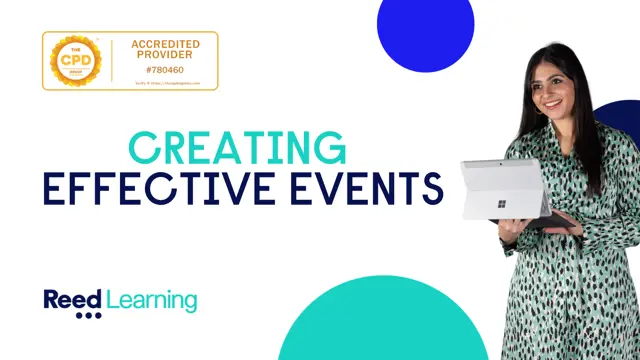
Creating Effective Events Training Course
Reed Learning
Summary
- Tutor is available to students
Add to basket or enquire
Overview
The Creating Effective Events course is designed for professionals involved in event planning and management. This comprehensive training program equips participants with the skills and knowledge needed to conceptualize, plan, and execute successful events that meet organizational goals and participant expectations.
Description
Event Planning Fundamentals:
- Understanding the key components of event planning.
- Setting clear objectives and defining success criteria.
- Budgeting, resource allocation, and timeline management.
Target Audience Analysis:
- Conducting demographic and psychographic analysis.
- Tailoring events to specific audience needs and preferences.
- Creating engaging and inclusive experiences for diverse attendees.
Effective Communication Strategies:
- Developing compelling event messaging.
- Utilizing various communication channels for promotion.
- Enhancing participant engagement through pre-event communication.
Logistics and Venue Management:
- Selecting appropriate venues based on event objectives.
- Negotiating contracts and managing vendor relationships.
- Overseeing logistical details, including transportation and accommodation.
Technology Integration:
- Leveraging technology for event promotion and registration.
- Incorporating digital tools for participant interaction.
- Managing virtual and hybrid events effectively.
Risk Management and Contingency Planning:
- Identifying potential risks and developing mitigation strategies.
- Creating contingency plans for unforeseen circumstances.
- Ensuring health and safety compliance.
Participant Experience Enhancement:
- Designing memorable and engaging event experiences.
- Incorporating interactive elements and networking opportunities.
- Collecting feedback for continuous improvement.
Post-Event Evaluation and Reporting:
- Developing post-event evaluation metrics.
- Analyzing data to measure event success and areas for improvement.
- Generating comprehensive reports for stakeholders.
Sustainability in Event Planning:
- Integrating environmentally friendly practices.
- Reducing waste and promoting sustainable event management.
- Meeting corporate social responsibility goals.
Who is this course for?
This course is suitable for professionals involved in event planning and management, including event coordinators, marketing professionals, and those responsible for organizing corporate, nonprofit, or public events.
Requirements
This course requires a minimum of 4 or more delegates for group participation, fostering collaborative learning and knowledge exchange among participants.
Questions and answers
Reviews
Currently there are no reviews for this course. Be the first to leave a review.
Legal information
This course is advertised on reed.co.uk by the Course Provider, whose terms and conditions apply. Purchases are made directly from the Course Provider, and as such, content and materials are supplied by the Course Provider directly. Reed is acting as agent and not reseller in relation to this course. Reed's only responsibility is to facilitate your payment for the course. It is your responsibility to review and agree to the Course Provider's terms and conditions and satisfy yourself as to the suitability of the course you intend to purchase. Reed will not have any responsibility for the content of the course and/or associated materials.


